The Nursing Home Law Center is committed to providing the legal resources necessary to hold negligent facilities accountable.
Atlanta Nursing Home Abuse Lawyer

Licensed in Georgia
The unfortunate reality of nursing home abuse is a growing concern across Atlanta, GA, and beyond.
Families entrust nursing homes with the care of their loved ones, expecting compassion, respect, and proper medical care. However, when elder abuse or neglect occurs, it can lead to devastating consequences for elderly residents and their families.
In such situations, seeking legal help from an experienced Atlanta nursing home abuse lawyer is crucial to protect the rights of the vulnerable and hold negligent nursing homes accountable.
Why Hire Nursing Home Law Center
At Nursing Home Law Center, we are dedicated to fighting for justice and fair compensation for those affected by nursing home abuse. Our skilled legal team has a strong history of handling these sensitive cases and securing substantial settlements and verdicts.
We thoroughly investigate every detail of the abuse, ensuring that all damages, such as medical costs, emotional distress, and other losses, are fully considered. With our in-depth knowledge of nursing home abuse claims, we handle the complexities of the process with efficiency and determination, relentlessly safeguarding your rights.
Throughout the case, we offer clear, compassionate guidance, ensuring you and your family remain informed, supported, and reassured at every stage.
Types of Cases Handled by Our Atlanta Nursing Home Abuse Lawyers
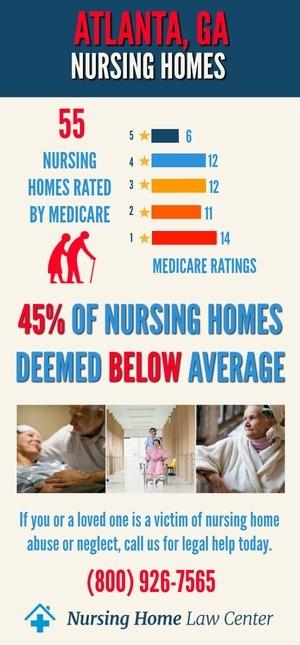
Nursing home abuse refers to any form of mistreatment or neglect in a nursing home or long-term care facility that causes harm to an elderly resident. Abuse can take many forms, each equally serious, and our Atlanta nursing home abuse lawyers have experience handling a wide range of cases, including:
Physical Abuse
Physical abuse involves the intentional infliction of pain or injury on a nursing home resident. This assault could include hitting, pushing, or misusing restraints, resulting in serious injuries such as broken bones, bruises, or pressure sores. Physical assault is one of the most visible forms of elder abuse, yet it can often go unreported by vulnerable victims.
Mental and Emotional Abuse
Mental and emotional abuse occurs when nursing home staff use verbal threats, intimidation, or isolation to cause distress in elderly patients. It can lead to severe emotional and psychological damage, resulting in anxiety, depression, or mental anguish. Emotional abuse is more challenging to detect than physical abuse, but its impact can be just as harmful.
Sexual Abuse
Sadly, sexual abuse can occur in nursing homes, leaving vulnerable residents traumatized. This form of abuse includes any unwanted sexual contact or activity forced upon a nursing home resident. Nursing home negligence that makes residents more vulnerable to abuse can include practices such as failing to screen employees properly.
Medical Malpractice
Medical malpractice in nursing homes refers to situations where elderly people or vulnerable residents suffer injuries due to improper medical treatment. This professional negligence can lead to bedsores (pressure sores), medication errors, and inadequate medical care.
In such cases, the nursing home’s negligence in monitoring medical conditions or providing proper medical treatment can lead to severe injuries or even wrongful death.
Negligence
Negligence in nursing homes can manifest in various ways, including poor hygiene, malnutrition, dehydration, and elopement (when a resident wanders away from the facility unsupervised). Negligence often stems from understaffing or poorly trained nursing home attendants, leading to serious harm to residents.
Financial Abuse
Financial abuse happens when nursing home staff or others exploit an elderly resident’s finances. This could involve forging signatures, coercing residents into signing documents, or outright theft of personal belongings or money. Financial abuse can lead to financial ruin for victims and their families.
Wrongful Death
In the worst cases, elder abuse and neglect can lead to a resident’s death. Wrongful death lawsuits may arise when a loved one’s death results from abuse, negligence, or medical malpractice in a nursing home facility. An Atlanta nursing home abuse attorney can help families seek justice for the wrongful loss of their loved one.
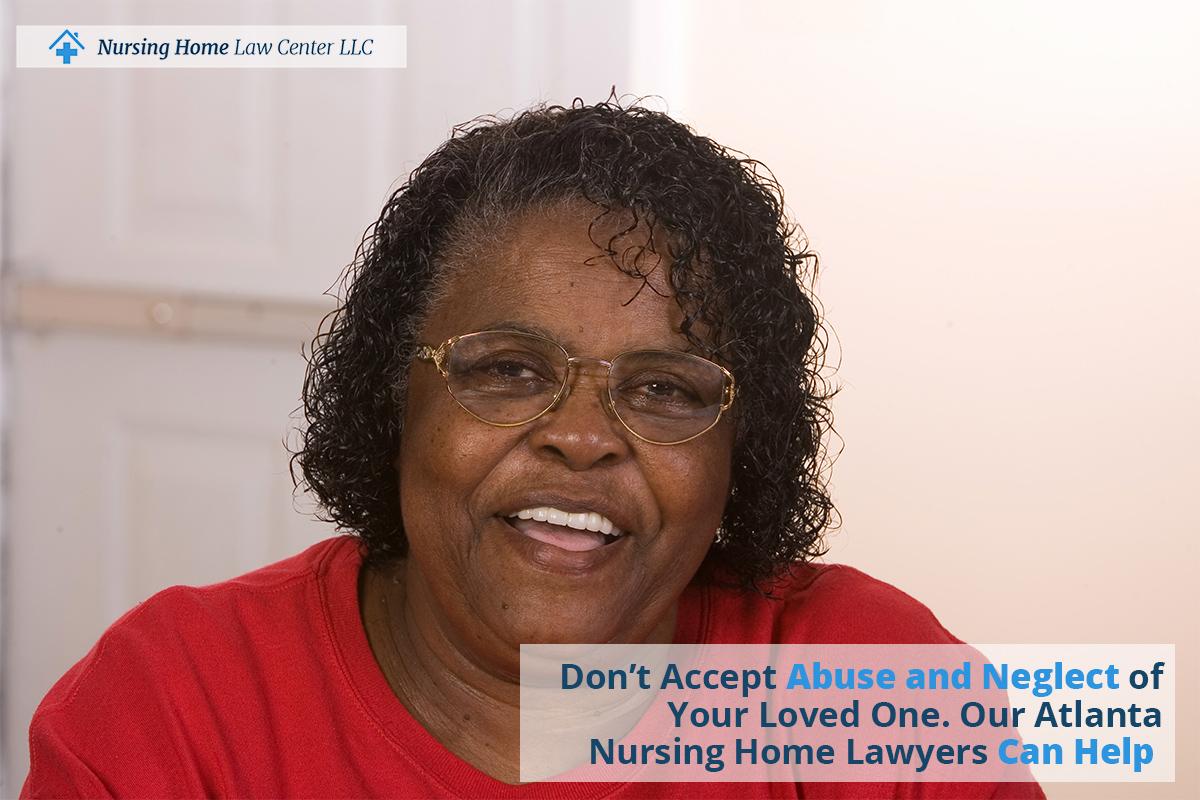
Understanding Your Legal Rights in Atlanta, Georgia
Nursing home residents in Atlanta are protected under federal and state laws.
The Nursing Home Reform Act of 1987 sets forth residents’ rights to receive proper care and protection from abuse, neglect, and mistreatment in long-term care facilities.
Georgia statutes also establish clear guidelines to ensure the safety of elderly people and vulnerable residents. If these laws are violated, families have the right to report nursing home abuse and pursue legal claims against the responsible parties.
Eligibility to File a Nursing Home Abuse Claim
In most cases, the resident or a family member can file a nursing home abuse claim. If a resident has passed away due to injuries caused by abuse, family members or legal representatives may file wrongful death claims.
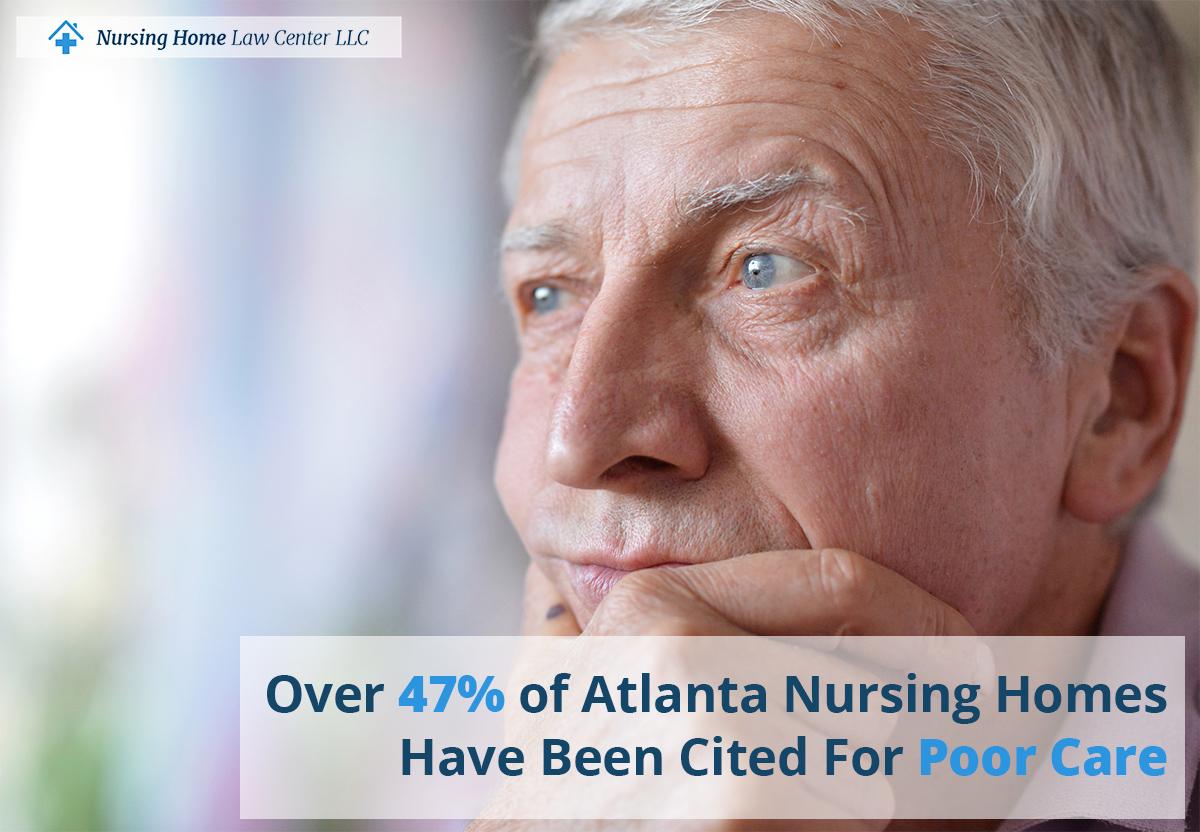
Liability in Nursing Home Negligence and Abuse Cases
In cases of nursing home neglect and abuse, multiple parties can be held responsible for the harm caused to vulnerable older residents. Liability isn’t limited to the direct caregivers; it can extend to various individuals and entities involved in the resident’s care. Here are a few examples:
- Nursing Home Facility: The nursing home itself may be liable for poor hiring practices, inadequate staff training, or failure to maintain a safe environment, which leads to neglect or abuse.
- Nursing Home Staff: Individual caregivers or staff members can be held responsible for direct acts of abuse, such as physical or emotional mistreatment of residents.
- Medical Providers: Doctors, nurses, or other medical professionals employed by the nursing home could be liable for medical malpractice, such as neglecting to provide proper care or medication.
- Third-Party Contractors: Outside contractors, such as maintenance staff or therapists hired by the facility, can also be responsible if their negligence leads to injuries or abuse.
- Corporate Ownership: If the nursing home is part of a larger corporation, the parent company may also face liability for failing to provide adequate resources or oversight, contributing to the abuse or neglect.
How Our Atlanta Nursing Home Abuse Attorneys Can Help
At Nursing Home Law Center, our Atlanta nursing home abuse lawyers are dedicated to seeking justice for vulnerable victims and their families. With extensive experience handling personal injury cases, we offer comprehensive legal services, including:
Free Case Evaluation
We offer a free consultation to discuss the details of your nursing home abuse case and determine the best course of action.
Case Investigation
Our legal team conducts thorough investigations to gather evidence of abuse or neglect, such as reviewing medical records, interviewing witnesses, and inspecting the nursing home facility.
Filing the Claim
Once we establish the evidence, we will file a legal claim against the negligent parties, ensuring that your rights are protected.
Settlement Negotiation
Our attorneys are skilled negotiators and will work with the nursing home’s insurance company to reach a fair settlement for your loved one’s injuries.
Trial Representation
If a fair settlement cannot be reached, we are fully prepared to take your case to trial to fight for justice and compensation.
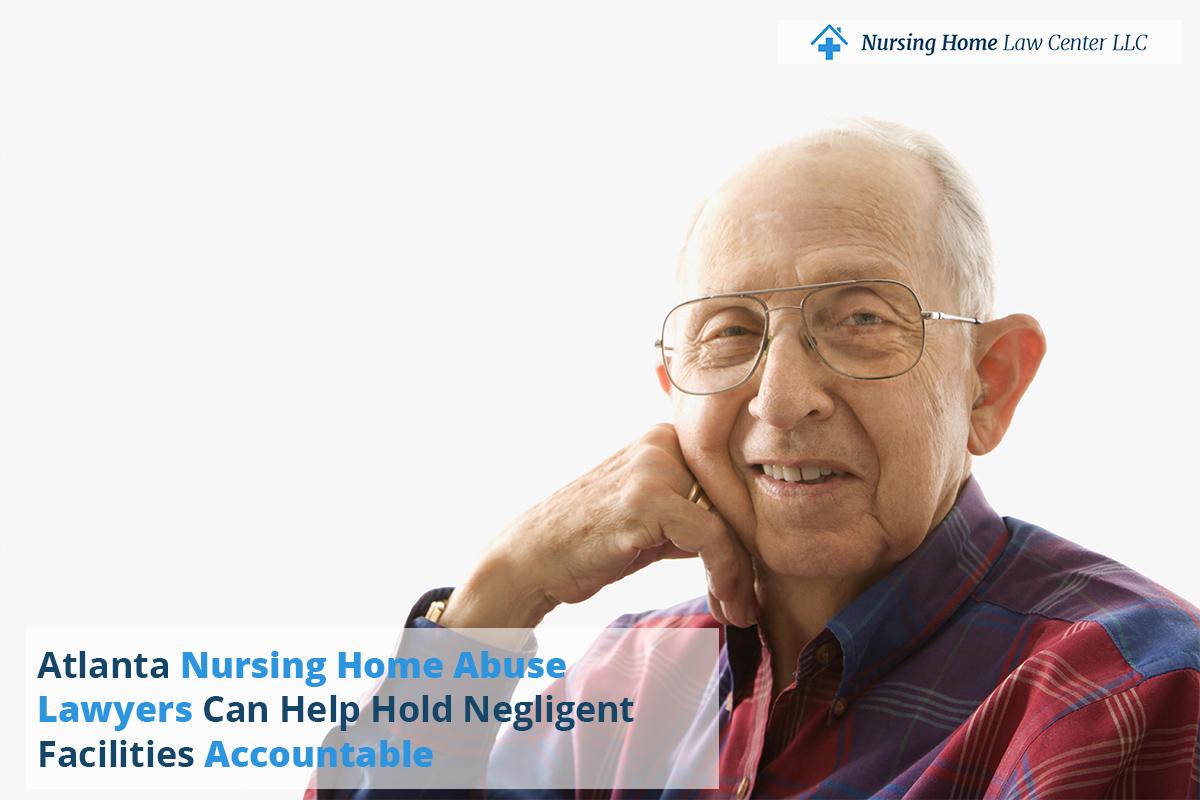
Common Signs of Elder Abuse Among Nursing Home Residents
There are 65 Medicare-approved nursing homes in Atlanta, Georgia, and a significant portion of these facilities are struggling with their overall ratings and inspections.
Specifically, 47 of personal care homes, or 72%, have received an overall rating of below or much below average.
Health inspections present challenges, as 42 long-term care facilities, or 65%, scored poorly in this category, suggesting widespread issues related to compliance with state and federal health regulations, potentially affecting residents’ well-being.
Staffing levels are a critical concern, with 46 nursing homes (71%) receiving below-average ratings, reflecting difficulties in providing consistent, adequate care for residents, impacting their day-to-day well-being and long-term health.
Lastly, 18 nursing homes (28%) received low ratings in quality measures, indicating a significant issue in maintaining residents’ overall quality of care. [1]
The worst-rated nursing homes in Atlanta include:
| A.G. Rhodes Home, Inc – Cobb | Autumn Breeze Health and Rehab |
| Buckhead Center for Nursing and Healing | Bonterra Transitional Care & Rehabilitation |
| Cambridge Post Acute Care Center | Douglasville Nursing and Rehabilitation Center |
| East Lake Arbor | Fountainview Ctr for Alzheimer |
| Fulton Center for Rehabilitation LLC | Glenwood Health Center by Harborview |
| Healthcare at College Park, LLC | Lake City Nursing and Rehabilitation Center LLC |
| Marietta Center for Nursing and Healing | Mesun Health and Rehabilitation Center |
| Nurse Care of Buckhead | Parkside Post Acute and Rehabilitation |
| Perimeter Rehabilitation Suites by Harborview | Powder Springs Center for Nursing & Healing |
| Pruitthealth – Brookhaven | Pruitthealth – Lilburn |
| Pruitthealth – Virginia Park | Riverdale Center for Nursing and Healing |
| Roswell Nursing & Rehab Center | Sadie G. Mays Health & Rehabilitation Center |
| Sandy Springs Center for Nursing and Healing LLC | Tower Road Post Acute, LLC |
| Westminster Commons | Westbury Center of Conyers for Nursing and Healing |
Recognizing the signs of nursing home abuse is critical in protecting your loved ones. Some common signs include:
- Unexplained bruises, broken bones, or other severe injuries
- Sudden weight loss, malnutrition, or dehydration
- Poor hygiene or unsanitary conditions
- Emotional withdrawal, depression, or fearfulness
- Bedsores or pressure sores
- Sudden changes in financial accounts or missing personal belongings
What to Do If You Suspect Nursing Home Negligence or Abuse
If you suspect that a loved one is being abused in a nursing home, follow these steps:
- Call 911 if your loved one is in immediate danger.
- Report the abuse to the nursing home administrator or management.
- File a formal complaint with your local Ombudsman’s office, whose role is to investigate nursing home complaints and advocate for residents’ rights.
- Contact an experienced Atlanta nursing home abuse lawyer to protect your loved one’s safety and explore legal options.
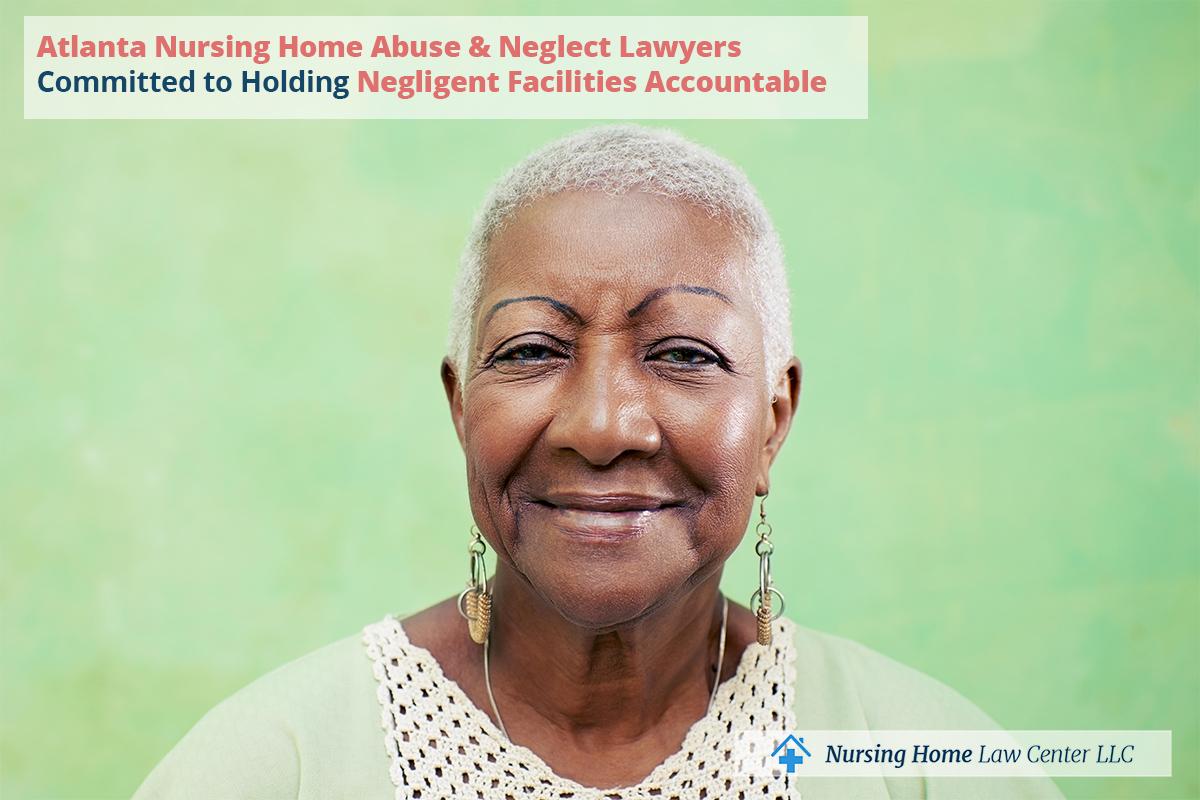
Damages You Can Recover Through a Nursing Home Abuse Claim
When a nursing home abuse claim is successful, victims and their families may be entitled to various forms of compensation.
Economic damages cover the financial costs directly related to the abuse or neglect. Examples include:
- Medical bills
- Relocation costs
- Funeral and burial expenses
Non-economic damages are intended to compensate for the non-financial harm suffered, which can be just as impactful. Examples include:
- Pain and suffering
- Loss of enjoyment of life
- Emotional distress
In cases of extreme misconduct, punitive damages may be awarded to punish the nursing home or staff for their actions and deter similar behavior in the future. These damages go beyond compensating the victim and aim to send a strong message about the consequences of egregious abuse or neglect.
The Cost of Hiring an Atlanta Nursing Home Abuse Attorney
At Nursing Home Law Center, we work on a contingency fee basis, which means you don’t pay any upfront legal fees. We only collect a fee if we successfully recover compensation for you. This arrangement ensures you can pursue justice without worrying about the cost of hiring an attorney.
You Have Limited Time to Take Legal Action in Atlanta
It’s essential to act quickly if you suspect nursing home abuse, as Georgia law imposes a statute of limitations on filing claims. Typically, families have two years to file a personal injury or wrongful death lawsuit. If you miss this deadline, you may lose your right to seek justice and compensation.
Contact Our Atlanta Nursing Home Neglect Lawyers Today!
If you or a loved one has suffered abuse in an Atlanta nursing home, our experienced Georgia nursing home abuse attorneys are here to help. With a proven track record of handling nursing home abuse cases, we are committed to seeking justice and protecting the rights of vulnerable residents.
Contact us today for a free consultation, and let us help you hold those responsible accountable for their actions.
Call us at (800) 926-7565 or fill out our contact form.
References: [1] Medicare
Georgia Nursing Home Abuse Lawyers
Georgia nursing home abuse lawyers are committed to seeking justice for families across the state. From Athens to Augusta, Columbus, Northeast Cobb County, and Savannah, our dedicated legal team is prepared to fight for the compensation your loved one deserves. If you suspect neglect or abuse, contact a lawyer in Georgia today for personalized support and guidance throughout the legal process.

